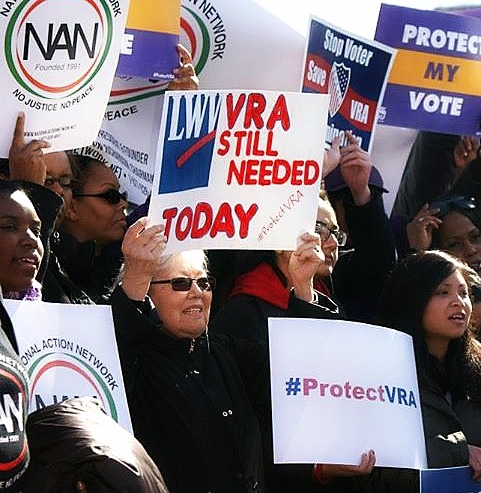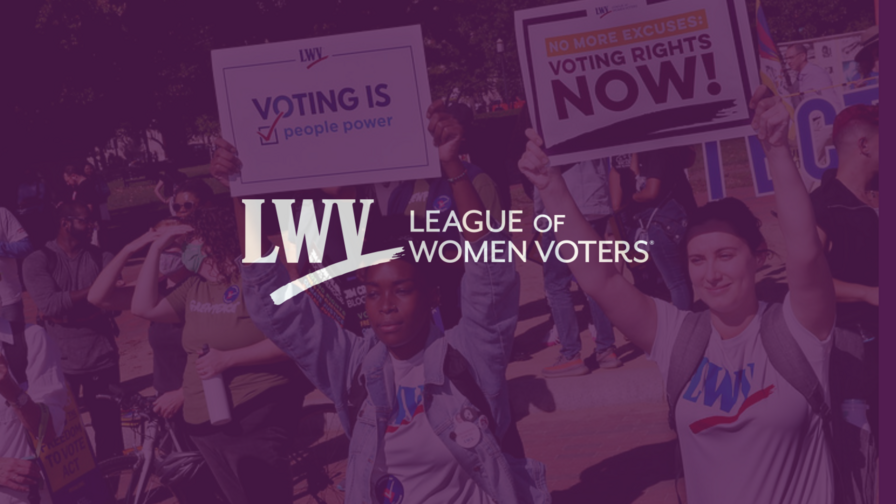Protecting the Rights of Voters with Disabilities
This blog was written by legal intern Mackenzie Saunders.
Voting is a fundamental right. Yet voters with disabilities face persistent barriers to casting a ballot, including restrictions on receiving assistance during the voting process imposed by state law. Such restrictions are a form of voter suppression and deny voters with disabilities equal access to the ballot.
Fortunately, these laws can be challenged under Section 208 of the Voting Rights Act of 1965 (VRA), which requires that states allow people with disabilities to receive assistance in the voting process.
What is Section 208 of the VRA?
Section 208 is a provision of the VRA that creates federal protections for voters with disabilities who need assistance while voting.
Stay Updated
Keep up with news on voting rights legislation and more by joining our email list!
Congress passed the VRA in 1965 to remedy longstanding racial discrimination in voting, especially against Black voters in the Deep South. The VRA addressed the policies and procedures that prevented Black voters from registering to vote and casting a ballot and put preventative measures in place to prevent further racial discrimination in voting. Since then, Congress has amended the VRA five times to guarantee voting rights protections to even more communities historically excluded from the voting process.
In 1982, Congress added Section 208, which guarantees protection for people with disabilities who need voter assistance. Section 208 reads:
"Any voter who requires assistance to vote by reason of blindness, disability, or inability to read or write may be given assistance by a person of the voter’s choice, other than the voter’s employer or agent of that employer or officer or agent of the voter’s union."
Section 208 not only requires states to accommodate voters with disabilities who need assistance, it creates the right to file a lawsuit to enforce this change. For example, suppose a state infringes on a voter’s right to receive assistance under Section 208 by passing a law that limits who can assist them in returning an absentee ballot. In that case, a voter can file a lawsuit to stop that law.

Barriers for Voters with Disabilities
While the passage of Section 208 was monumental for the disability rights movement, barriers for voters with disabilities persist. This is because states nationwide are passing harmful voter assistance restrictions limiting voters' opportunities to cast their ballots.
The number of laws restricting voter assistance that have been proposed and passed is increasing. The Brennan Center for Justice reports that in the year before the 2024 election, at least 14 states enacted restrictive voting laws that harm voters with disabilities, including laws limiting voter assistance.
Common assistance restrictions include
- Restrictions on who can assist a voter with their absentee ballot;
- Limits on the number of absentee ballots someone can return; and
- Intensive requirements imposed on assistors.
These restrictions conflict with the rights created by Section 208 and required under federal law.
At least 25 states currently restrict who can return another voter’s absentee ballot. In Missouri, you can return a voter's ballot only if you are “a relative within the second degree of consanguinity or affinity” of the voter. In Georgia, it is a felony to return another voter’s absentee ballot unless you’re a family member, household member, or caregiver. Georgia has not clarified who qualifies as a “caregiver.” These laws pose barriers for the many voters who don’t live near or with family or a roommate and are unclear about the protections provided to anyone who considers themselves a “caregiver."
Many states restrict the number of ballots a person can return. For example, in Arkansas, you can’t return more than two additional ballots unless you are an administrator of a long-term care facility. In Florida, it is a “misdemeanor to return more than two mail-in ballots, in addition to their own ballot and ballots from immediate family members.” This restricts the supportive capabilities of anyone who may work as a non-administrator in a caregiving facility or have several friends or family members who need assistance.
Some states also impose intensive requirements on voting assistors. For example, to return another voter’s absentee ballot in Maine, “the ballot must be signed in the presence of a notary, a clerk of a municipality or court, or two witnesses.”

Some legislators argue that these laws protect us from voter fraud, but these claims have repeatedly been proven false. The Brennan Center for Justice reports that the rates of voter fraud through absentee and mail-in ballots are incredibly low, noting that “it is still more likely for an American to be struck by lightning than to commit mail voting fraud.”
All these laws ultimately have the same effect: they make it harder for people with disabilities to vote. Voters with disabilities already experience barriers at a much higher rate than voters without disabilities; the US Election Assistance Commission found that one in seven voters with disabilities reported difficulties voting in the 2022 midterms, and disabled voters were 15% more likely than non-disabled voters to encounter difficulties. Laws that restrict ballot return assistance make it even harder for disabled voters to cast their ballots, a consequence that could potentially deter people with disabilities from voting.
Using Section 208 to Protect Voters with Disabilities
Section 208 can help tear down these barriers. When voters with disabilities experience obstacles to receiving election assistance, they can sue under Section 208 and defend their right to vote.
Voters with disabilities aren’t the only ones who can sue under Section 208. These lawsuits can also be brought by organizations that represent and help voters with disabilities. This includes civil rights organizations like the NAACP, disability rights organizations like Disability Rights Mississippi, and voting rights organizations like the League.
Right now, the League has three active lawsuits with Section 208 claims.
The League’s Section 208 Cases
In Mississippi, the League challenged a state law that criminalizes helping people return their absentee ballots. LWV Mississippi and its co-plaintiffs asked the court to block the law ahead of Mississippi’s statewide general election in 2023. They argued that the law unlawfully restricted the protections created by Section 208, which states that voters “may be given assistance by a person of the voter’s choice.” The court agreed: in July 2023, it ruled in favor of the League on its Section 208 claim and struck down the law for the forthcoming election. The case is currently on appeal.
In Ohio, the state League filed a similar Section 208 claim to block an Ohio law that restricts who can return another voter’s absentee ballot, violating Section 208. Under Ohio’s law, a grandchild who returns their grandparent’s absentee ballot could be criminally charged. The case is pending.
In April 2024, the League filed a lawsuit in Alabama seeking to strike down a voting law, SB 1, that makes it a felony to help someone apply for an absentee ballot. LWV Alabama and its co-plaintiffs brought a Section 208 claim, asserting that SB 1 targets the people and organizations that voters with disabilities rely on to access their ballots. Under SB 1, voters with disabilities can no longer receive voting assistance from the person of their choice, which limits their ability and opportunity to vote.
Although the number of restrictive voter assistance bills is on the rise, Section 208 remains a strong protection for voters. Every voter has the equal right to cast their ballot, and Section 208 ensures that voters with disabilities are no exception. The League is proud to be part of the fight for truly equal access to the ballot.
The Latest from the League
A coalition of civil rights, voting rights and disability rights organizations suedto block Alabama’s recently enacted Senate Bill 1 (SB1). This law directly targets, drastically restricts, and severely penalizes basic nonpartisan civic engagement efforts that enable all Alabamians to access their right to vote.
GULFPORT, Miss. — Voting and disability rights advocates are asking to intervene in a lawsuit filed by the Mississippi Republican Party and Republican National Committee that seeks to overturn a Mississippi law that allows for people voting absentee to mail ballots up until Election Day, and to have those ballots counted if they’re postmarked by Election Day and received within five business days after.
COLUMBUS, Ohio — The League of Women Voters of Ohio and voter Jennifer Kucera filed a federal lawsuit today challenging a provision in House Bill 458 that impacts how voters with disabilities can cast absentee ballots. The plaintiffs are represented by the ACLU of Ohio, the American Civil Liberties Union, and the law firm of Covington & Burling.
Sign Up For Email
Keep up with the League. Receive emails to your inbox!
Donate to support our work
to empower voters and defend democracy.






